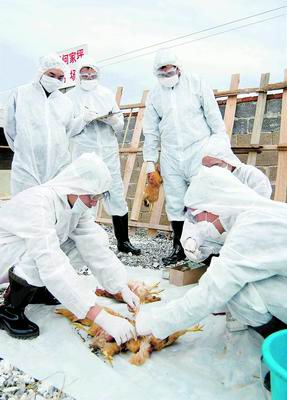
Quarantine workers cull "sick chickens" during an animal
epidemic control drill in Yongzhou City, Hunan Province yesterday. The drill
aimed to test readiness to fight a possible bird flu breakout. ¡ª Xinhua
China's fight against bird flu received a strong shot in the arm yesterday
the government has earmarked a special fund of 2 billion yuan (US$246.6 million)
for epidemic control.
"(We) must realize the severe and compelling situation in bird flu control,
maintain high vigilance, and never let down our guard," said a statement from a
State Council (China's cabinet) meeting held yesterday in Beijing.
The
meeting, presided by Premier Wen Jiabao, decided to set aside the amount from
this year's central budget for prevention and control of the highly pathogenic
avian influenza.
It also announced that it would reactivate the national command headquarters
to co-ordinate efforts against bird flu.
Observers noted the size of the fund exactly matches the budget allocation
made in April 2003 to fight against the SARS (severe acute respiratory syndrome)
contagion.
In addition to funding, the State Council said, any failure, delay or
cover-up in reporting outbreaks will be dealt with harshly, according to
sources.
Information about epidemics will be released accurately and in time, and
technological co-operation with other countries and international organizations
will be further enhanced, they said.
In case of a new outbreak, measures such as culling, disinfection and
quarantine should follow immediately to eradicate any infection at the site, the
statement said.
The meeting stressed that the country's priority is to ensure no one is
infected.
China has reported and brought under effective control three bird flu
outbreaks among poultry over the past month in North China's Inner Mongolia
Autonomous Region, and East China's Anhui and Central China's Hunan provinces.
No human case has been reported.
The State Council statement said the country should improve emergency
procedures and prevention and treatment measures for human infection, and
strengthen monitoring of live poultry markets.
In particular, veterinary workers at the grassroots level should receive more
training, and livestock-raising methods should be transformed so that poultry is
raised under advanced, hygienic standards and on a large scale.
Most Chinese poultry is raised in scattered, small courtyard farms with
little attention to hygiene, making them vulnerable to a possible contagion, Jia
Youling, director of the Veterinary Bureau under the Ministry of Agriculture
said on Friday.
Other measures adopted at the meeting included stepping up immunization in
border areas, poultry farms and wetlands; and giving priority to the development
of effective vaccines.
Yesterday's meeting came amidst reports of more bird flu outbreaks elsewhere
in the world, while various areas in China stepped up countermeasures.
Thailand yesterday reported a fresh outbreak of bird flu among poultry in the
central province of Ang Thong, the seventh province to be hit by the latest
flare-up of the disease, Reuters reported.
Thai Foreign Minister Kantathi Suphamongkhon said his country and Cambodia,
Myanmar, Laos and Viet Nam have agreed to co-operate fully to prevent outbreaks
of the deadly H5N1 strain of bird flu in the region, according to a Xinhua
report.
Meanwhile, China has suspended poultry and poultry-product imports from 14
countries, including Thailand, Viet Nam and Cambodia, where bird flu cases have
been reported, according to the Ministry of Commerce.
Also yesterday, a seminar in Beijing brought together Chinese agricultural
and quarantine officials and their United States counterparts to discuss ways to
stop the spread of bird flu.



